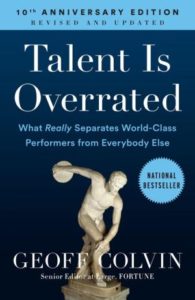
Talent Is Overrated
By Geoff Colvin
228 pages
Originally published in 2008
If I were to list the 100 best non-fiction books I’ve ever read, Talent Is Overrated would not be included. Not because it’s a bad book, but because it presents an argument about achievement and personal excellence that I was already quite familiar with.
In fact, I developed a nearly identical thesis in postings I wrote for Early to Rise more than 20 years ago. But there’s been a lot more research into the subject since then. And in Talent Is Overrated, Geoff Colvin does a good job of summing it all up. Which is to say, if you have ever wondered why some people develop mastery in certain areas while most lag far behind, this is a book I would recommend.
In the fall of 2000, I was thinking about skill development – what it takes to get better at complex skills, such as writing or playing chess or competing in martial arts – and wondering (perhaps because I was frustrated by my own pace of learning) why some people develop faster and farther than others.
There were quite a few interesting studies that I could have looked at. Instead, I did what I often did back then: I allowed myself to believe that my own experience was more than enough to answer my own questions.
I did some retroactive calculations on how long it took me to learn how to speak passable French, to write a successful sales letter, and to earn my black belt in Jiu Jitsu. And I measured the time in hours…
To begin the process of improving yourself, you must accept the fact that you are less than you want to be. As beginners in practicing a skill, we are almost all incompetent. If you aren’t humble enough to acknowledge that, you will resist taking the baby steps you need to take to eventually rise to a level of competence and then mastery.
In addition to humility, you need persistence, the willingness to put in the hours it takes to achieve whatever level of skill you are aspiring to. Based on my experience, it takes about 1,000 hours of practice to become competent in a complex skill, and 5,000 hours to achieve mastery. (With a teacher to guide you, maybe less.)
But practice doesn’t mean simply repeating a skill over and over again. It means doing it with awareness and attention. If all you are doing is going through the motions, your chances of improving are small.
When I wrote this 20 years ago, I believed I was introducing a brand-new idea into the marketplace of such ideas. In fact, as I said, that field of inquiry had already been studied at some length. And there was a Swedish psychologist, Anders Ericsson, that had come to a conclusion that was similar to mine. (He postulated 10,000 hours for “world class mastery,” a somewhat higher standard than I had in mind.)
Geoff Colvin serves up the same idea in Talent Is Overrated – but with a slightly different timespan, lots of additional backup, and some interesting thoughts and speculations. His prose is clean, his examples are entertaining, and the argument overall is convincing.
Here are a few nuggets I highlighted as I read:
* “Many people not only fail to become outstandingly good at what they do, no matter how many years they spend doing it, they frequently don’t even get any better than they were when they started.”
* “Being good at whatever we want to do is among the deepest sources of fulfillment we will ever know.”
* “IQ is a decent predictor of performance on an unfamiliar task, but once a person has been at a job for a few years, IQ predicts little or nothing about performance.”
* “In math, science, musical composition, swimming, X-ray diagnosis, tennis, literature – no one, not even the most “talented” performers, became great without at least 10 years of very hard preparation.”
“Deliberate practice,” Colvin says, is the key to achieving world-class performance. And he points out that this is usually done with a teacher’s help. (“Anyone who thinks they’ve outgrown the benefits of a teacher’s help should at least question that view.”)
“The great performers isolate remarkably specific aspects of what they do and focus on just those things until they are improved,” he says, “then it’s on to the next aspect. Only by choosing activities in the learning zone can one make progress. That’s the location of skills and abilities that are just out of reach…. Identifying the learning zone, which is not simple, and then forcing oneself to stay continually in it as it changes, which is even harder – these are the first and most important characteristics of deliberate practice.”
Not surprisingly…
It is hard work.
It does not feel like fun.
Critical Reviews
A few of the comments posted by readers on the GoodReads website:
* “One of, if not THE best book I read this year. Some of this book supported theories I’ve read in other books… yet Colvin presented the ideas backed with more research. This book reinforced my beliefs on the benefits of coaching. Colvin also pointed out specific ways to apply this knowledge to business.”
* “This book is overrated. After meandering for several chapters through what does NOT lead to high performance, Colvin finally gets around to arguing that the secret is ‘deliberate practice.’”
* “There are numerous good points about this book: good information based on solid scientific research; pretty good writing (not master level but close); cogent argument, and so on. That being said, this book leaves several threads hanging.”
Click here to watch a promotional video for the book by the author.
 MarkFord
MarkFord